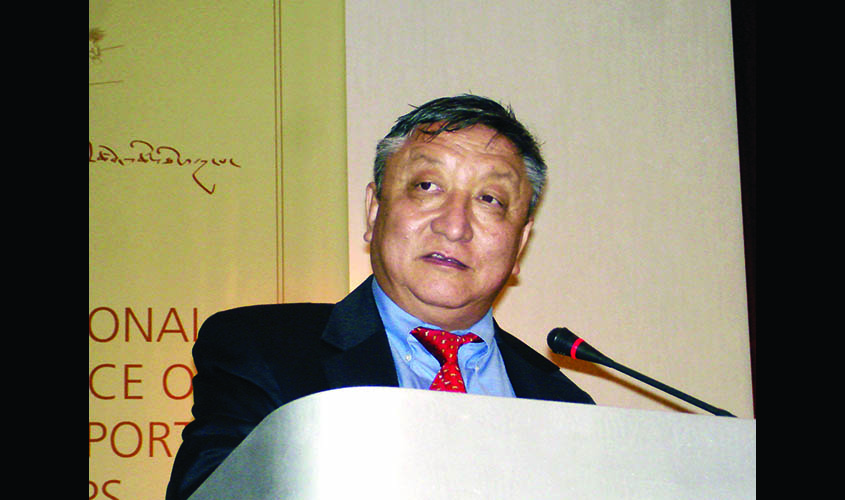On many occasions he made positive contributions to India-US relations and lobbied for Indian interests at Capitol Hill.
In the history of modern diplomacy, there have been few diplomats like Lodi Gyaltsen Gyari—who died on 29 October 2018—of Tibet, who delivered stunning results despite the most limiting and unfavourable situations. As a Tibetan he belonged to one of the smallest refugee Diasporas—total population lower than 150-thousand across the globe
His master, the Dalai Lama sent him to the United States as his special envoy in 1990, where he had already founded the International Campaign for Tibet (ICT)—a think-tank and advocacy group—in 1988, with his Tibetan colleague Tenzin Namgyal Tethong. Working as the president of ICT between 1991 and 1999 and later as the chairman of its executive board in Washington DC, until 2014, Lodi successfully won active support from, and influenced, innumerable statesmen, heads of states, policymakers, think-tanks and advocacy groups from across the world on the Tibetan cause.
Lodi Gyari’s team at ICT, which included famous Hollywood star Richard Gere and Matteo Mecacci, was able to get the issue of Tibet institutionalised in the US political system. So much so that he could successfully mobilise Congressmen from opposing sides of the US Congress to adopt the famous Tibet Policy Act (2002)’. This Act mandated the US government to appoint a “Special Coordinator for Tibet”, which provoked Beijing to cross the limits of accepted diplomatic norms.
His first major success came in 1991 when the UN Sub Commission on Prevention of Discrimination and Protection of Minorities passed a resolution on Tibet despite all threats and pressures from China. Lodi Gyari’s work and reputation grew beyond Tibet as he was trusted and consulted by many world leaders, think-tanks and policymakers on issues as wide as US-China, India-China and India-US relations. Many US watchers would certify that very few individual career diplomats have had as clear an understanding of the functioning of Capitol Hill or had as much personal access to its functionaries, including the White House, as Lodi commanded as an individual “representative” of “no government”.
No surprise, Lodi won the extraordinary distinction of a foreign diplomat who was formally praised by the US Senate. In a special resolution in 2012 (S. Res. 557) the US Senate admired Lodi Gyari’s personal contributions by stating that it “honors the services of Lodi Gyaltsen Gyari as Special Envoy of His Holiness the Dalai Lama; commends the achievements of Lodi Gyaltsen Gyari in building an international coalition of support for Tibet…”
There were many occasions when he made positive contributions to India-US relations and lobbied for Indian interests at the Capitol Hill. Lodi had his own logic behind his pro-India attitude. “As Tibetan refugees we have received so much of love and support from India. So it’s our duty to stand for India and support her whenever the situation demands”, he told this author on many occasions.
Lodi was born in 1949 as an incarnate Lama in an influential Khampa family of Nyarong in the eastern Kham province of Tibet. In the years following the Chinese occupation of Tibet, his parents took shelter in India. Looking back one can say that Lodi was born to create institutions. He was 18 when he founded and edited Voice of Tibet, the first English news magazine which has come to stay as Tibetan Review today. He also founded Sheja, the first Tibetan newspaper in exile. He was also one of three founders of Tibetan Youth Congress, which is the largest socio-political organisation of the exiled community.
In the 1970s, this author was deeply impressed by the ease with which Lodi would mix and rub shoulders with senior Indian stalwarts like Jay Prakash Narayan, Acharya Kripalani, Morarji Desai, George Fernandes, Madhu Limaye, Balraj Madhok, Ashok Mehta, M.L. Sondhi, P.N. Lekhi, Major General S.S. Uban and T.N. Kaw, among others. You name a leader or senior Indian bureaucrat and good chances were that Lodi could call at his or her home within the next one hour.
As an activist himself, Lodi won elections for the exile-Parliament and soon became the youngest Speaker of the Tibetan House. Later, Dalai Lama inducted him into his Cabinet, where he served until he was deputed to the United States as his special envoy. Later he represented Dalai Lama as his chief negotiator with Beijing from 2002 to 2010. Unfortunately, Beijing used this period to fortify its position inside occupied Tibet and did not allow the talks to succeed.
Richard Gere, famous Hollywood personality and Lodi’s best friend and successor in ICT, paid tributes to him by describing him as “my dear friend and partner and mentor for over 30 years”. In her statement condoling Lodi’s demise, Nancy Pelosi, a leading Democrat leader expressed her gratitude to him as her “teacher”. She said: “The world has lost an extraordinary champion for the Tibetan people…Lodi Gyari was a religious leader and a diplomat, an administrator and an activist, but, most of all, he was a teacher. Through diplomacy, he taught us to how to seek understanding and create peace. Through advocacy, he taught us how to share the spirit of resilience with our children. Through faith, he taught us that all nations and all people are interconnected.”
Also, there are innumerable admirers and friends of Lodi Gyari like me who will miss him as a great friend who remembered each individual’s personal choices and tendencies. Tibet, especially Dalai Lama, will miss their Chanakya.
Vijay Kranti is a senior journalist, Tibetologist and Chairman, Centre for Himalayan Asia Studies and Engagement.

